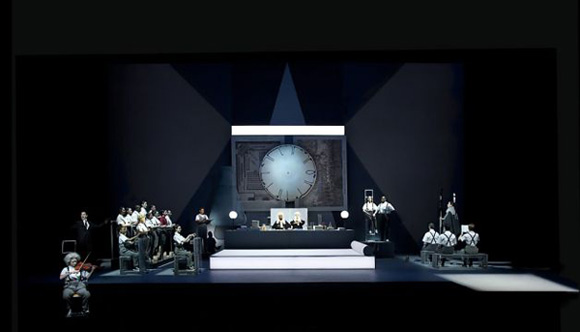SFGate
By Joshua Kosman
October 25, 2012
original
link
New twists in 'Einstein on Beach' revival

Violinist Jennifer Koh (front l.) as Einstein with the cast of "Einstein on the Beach" Photo: Lucie Jansch / SF
Like Brigadoon but at more frequent intervals, "Einstein on the Beach" seems to rear its head every few years, change everyone's lives and then disappear into the mists once again. Since 1976, when director Robert Wilson and composer Philip Glass unveiled their plotless, five-hour theatrical spectacle in a rented-out Metropolitan Opera House, the number of people who have actually experienced the piece is a small fraction of those who know its music or have felt its influence.
This weekend brings a new touring production of "Einstein" - the work's first revival in 20 years - to Cal Performances for three sold-out performances. And it finds the piece at that fascinating juncture that every performance-based work has to go through sooner or later if it is to become a part of a living repertoire: the point at which the original creators relinquish it to new interpreters.
In the case of "Einstein," the transition (perhaps fittingly, given the style of the piece) is incremental but unmistakable. The Philip Glass Ensemble will still be in the pit, and Wilson took a hands-on role in reshaping and even rethinking the current incarnation, which began in January at the University of Michigan in Ann Arbor.
But the figures onstage represent a new generation of performers in the work's history. The two main female dancing and speaking roles, originally created by choreographer Lucinda Childs and Sheryl Sutton, have been taken over by Helga Davis and Kate Moran.
Perhaps even more strikingly, the embodiment of the title character - an onstage solo violinist - has been entrusted to the brilliant Korean American violinist Jennifer Koh. It's her first encounter with "Einstein."
"I wasn't born yet when the work was premiered," said Koh, 35, "and I was too young for the last revival. But I've been working toward this kind of immersive project for a while now, doing all-Bach marathons in which I played all six sonatas and partitas without an intermission."
It was Matías Tarnopolsky, the director of Cal Performances, who suggested that Koh might think about plunging into the broader landscape of "Einstein," a work she knew only in "snippets." And there was more to the learning curve.
"I've never done stage things before - never acted, never been in costume. They'd say, 'Enter from stage right,' and I didn't know which side that was. Bob would use terminology that actors would all understand, and then he would end up telling me stories that would help me find what he wanted."
For Davis and Moran, Wilson's stately, hieratic stage style represented a more familiar world. Davis appeared in "The Temptation of Saint Anthony," Wilson's 2003 operatic treatment of the Flaubert novel, and Moran immersed herself in Wilson's oeuvre while a theater student at New York University.
"For me, discovering Bob's work was like finding a theatrical vocabulary that I'd been searching for since I was 16 without even knowing it," said Moran. "And 'Einstein' was one of the big opuses to study."
Moran inherited the role created by Childs, and meticulously researched the original production, looking at surviving videotapes and talking to Childs.
"I wanted to do as much honor as I could to the original creation. But then, after doing all that homework, I had to put it away. That work was important to so many people, but it's the 21st century; we need to do the 'Einstein' of now, not just a reproduction."
Some performers, such as soprano Lisa Bielawa, find themselves playing a sort of pivotal role in the generational transition. A member of the Philip Glass Ensemble for 20 years, she was onstage in the 1992 production as part of the chorus; now she's the choirmaster, a role she describes as being "like a proud big sister" to the singers she's enlisted for this revival.
"What I found is that young singers are better equipped to sing this kind of music now than they were 20 years ago. At the time, Philip's music wasn't like anything they had studied. But now, singers are coming out of the conservatory at Eastman or Indiana University where their fellow composers are writing in styles influenced by minimalism, so this is par for the course."
Still, the long stretches of time and the extended repetitions of "Einstein" represent a step up from anything most singers are used to.
"This is no joke," says Bielawa. "Even among Philip's repertoire, this is very heavy lifting. So it's fun for me to pass on all the little tricks I've learned over the years for increasing your accuracy and stamina."
Davis, a stylistically omnivorous singer and stage performer, has a few tricks of her own for keeping her head in the game through the long hours onstage, devoted to reciting verbal texts without giving them too much meaning.
"The danger is that if we begin to interpret the texts, the performance becomes completely dead. Everyone must be free to have their own experience of the words, and our work is to just say them. I always think of Charlie Parker, and try to say the text like a kind of wordless solo."
Another technique she favors is more offbeat.
"I have 'Star Trek' flashbacks," she said. "I try to remember the stardates of my favorite episodes and call out those numbers."
This article has been corrected since the print edition.
Einstein on the Beach: 6 p.m. Friday, 5 p.m. Saturday, 3 p.m. Sunday. Zellerbach Hall, UC Berkeley. $35 (Sold out). (510) 642-9988. calperfs.berkeley.edu.
Joshua Kosman is The San Francisco Chronicle's music critic
Copyright ©2012 SFGate
© Jennifer Koh, All Rights Reserved. Photography by Juergen Frank. Site by ycArt design studio